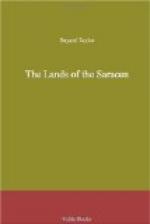I passed an uncomfortable night at the Venta de Villalon, lying upon a bag stuffed with equal quantities of wool and fleas. Starting before dawn, we followed a path which led into the mountains, where herdsmen and boys were taking out their sheep and goats to pasture; then it descended into the valley of a stream, bordered with rich bottom-lands. I never saw the orange in a more flourishing state. We passed several orchards of trees thirty feet high, and every bough and twig so completely laden with fruit, that the foliage was hardly to be seen.
At the Venta del Vicario, we found a number of soldiers just setting out for Ronda. They appeared to be escorting a convoy of goods, for there were twenty or thirty laden mules gathered at the door. We now ascended a most difficult and stony path, winding through bleak wastes of gray rock, till we reached a lofty pass in the mountain range. The wind swept through the narrow gateway with a force that almost unhorsed us. From the other side, a sublime but most desolate landscape opened to my view. Opposite, at ten miles’ distance, rose a lofty ridge of naked rock, overhung with clouds. The country between was a chaotic jumble of stony hills, separated by deep chasms, with just a green patch here and there, to show that it was not entirely forsaken by man. Nevertheless as we descended into it, we found valleys with vineyards and olive groves, which were invisible from above. As we were both getting hungry, Jose stopped at a ventorillo and ordered two cups of wine, for which he insisted on paying. “If I had as many horses as my master, Napoleon,” said he, “I would regale the Senors whenever I travelled with them. I would have puros, and sweetmeats, with plenty of Malaga or Valdepenas in the bota, and they should never complain of their fare.” Part of our road was studded with gray cork-trees, at a distance hardly to be distinguished from olives, and Jose dismounted to gather the mast, which was as sweet and palatable as chestnuts, with very little of the bitter quercine flavor. At eleven o’clock, we reached El Burgo, so called, probably, from its ancient Moorish fortress. It is a poor, starved village, built on a barren hill, over a stream which is still spanned by a lofty Moorish bridge of a single arch.
The remaining three leagues to Ronda were exceedingly rough and difficult. Climbing a barren ascent of nearly a league in length, we reached the Puerto del Viento, or Gate of the Wind, through which drove such a current that we were obliged to dismount; and even then it required all my strength to move against it. The peaks around, far and near, faced with precipitous cliffs, wore the most savage and forbidding aspect: in fact, this region is almost a counterpart of the wilderness lying between Jerusalem and the Dead Sea, Very soon, we touched the skirt of a cloud, and were enveloped in masses of chill, whirling vapor, through which we travelled for three or four miles to a similar gate on the western side of the chain. Descending again, we emerged into a clearer atmosphere, and saw below us a wide extent of mountain country, but of a more fertile and cheerful character. Olive orchards and wheat-fields now appeared; and, at four o’clock, we rode into the streets of Ronda.




